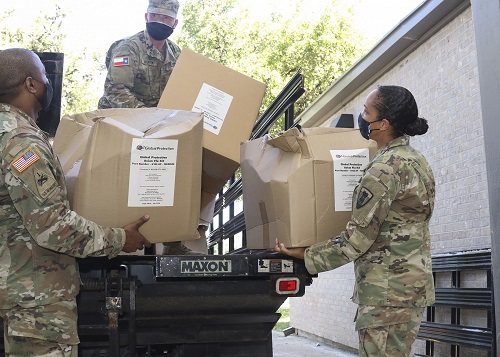Story and photos by Staff Sgt. D. Michael Giles, 36th Infantry Division, Texas Army National Guard
CAMP MABRY, Texas—Texas Military Department service members prepared to support the Texas Division of Emergency Management in long-term care facility COVID-19 disinfection operations on May 8- 9, 2020, at Camp Mabry in Austin, Texas.
 Members of the Texas Military Department's Joint Task Force 176—Texas State Guard Pfc. Jason Hunter, Texas National Guard Capt. Stephanie Enloe, the task force's medical operations officer, and Sgt. 1st Class Rajendran Kumaraswamy, the task force's medical noncommissioned officer—unload disinfecting kits for Soldiers preparing to support long-term care facility disinfection operations at Camp Mabry, in Austin, Texas, May 7, 2020. Joint Task Force 176, a unit of Texas Military Department personnel who have been distributing food and supplies during the COVID-19 pandemic, are now preparing to support the Texas Division of Emergency Management in disinfecting long-term care facilities. (U.S. Army National Guard photo by Staff Sgt. Michael Giles, 36th Infantry Division Public Affairs)
Members of the Texas Military Department's Joint Task Force 176—Texas State Guard Pfc. Jason Hunter, Texas National Guard Capt. Stephanie Enloe, the task force's medical operations officer, and Sgt. 1st Class Rajendran Kumaraswamy, the task force's medical noncommissioned officer—unload disinfecting kits for Soldiers preparing to support long-term care facility disinfection operations at Camp Mabry, in Austin, Texas, May 7, 2020. Joint Task Force 176, a unit of Texas Military Department personnel who have been distributing food and supplies during the COVID-19 pandemic, are now preparing to support the Texas Division of Emergency Management in disinfecting long-term care facilities. (U.S. Army National Guard photo by Staff Sgt. Michael Giles, 36th Infantry Division Public Affairs)
Army National Guard Soldiers with Joint Task Force 176 convened at the task force’s headquarters to receive personal protective equipment and sanitizing kits on May 8, 2020. The following day, they received training from the National Guard’s 6th Civil Support Team on how to safely don and doff protective gear, as well as how to administer the disinfectants.
“This mission is important to protect our most vulnerable population,” said 1st Lt. Joseph Warth, battle captain with the Texas Military Department’s Joint Task Force 176, who explained that National Guard disinfection teams will work in support of Texas Division of Emergency Management efforts to sanitize facilities where occupants have tested positive for COVID-19.
“We will go in and ensure that residents are protected,” Warth said. “That’s what we’re here for.”
Spc. Precious Watkins, a Texas Army National Guard culinary specialist assigned to Joint Task Force 176, said this mission hits close to home for her as an individual with elder relatives who have endured various significant health issues.
“In the class today we talked about how people who have had strokes or heart attacks are more vulnerable to COVID-19,” Watkins said. “That’s a little scary for me.”
As part of their preparation, the Soldiers received a day of training from the Texas National Guard’s 6th Civil Support Team.
Maj. Peter Ammerman, operations officer with Joint Task Force 176, said National Guardsmen are capable of quickly learning and executing such tasks because their dual-footing in the military and civilian life makes them well-rounded and adaptive.
“Not only are they Army Soldiers and Air Force Airmen, but they’re also civilians who do a lot of different things,” Ammerman said. “They’re able to get out there and truly do whatever the State of Texas asks them to do.”